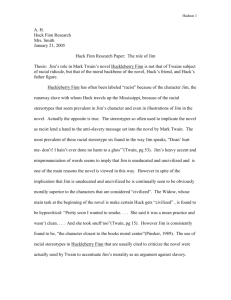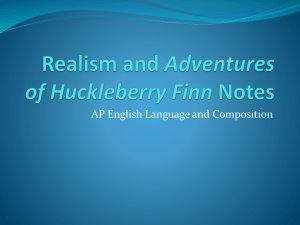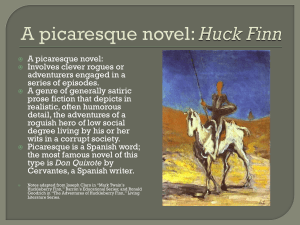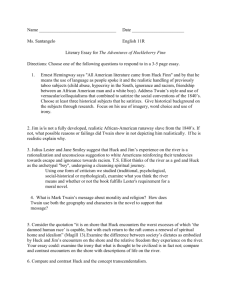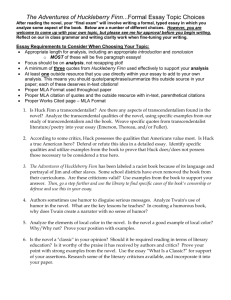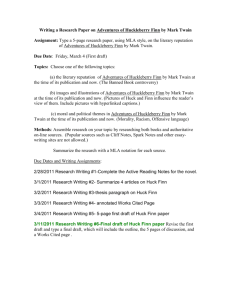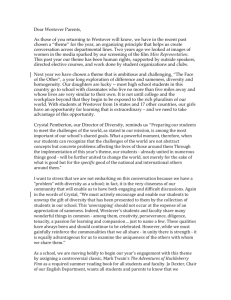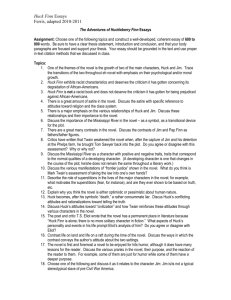American Studies
advertisement
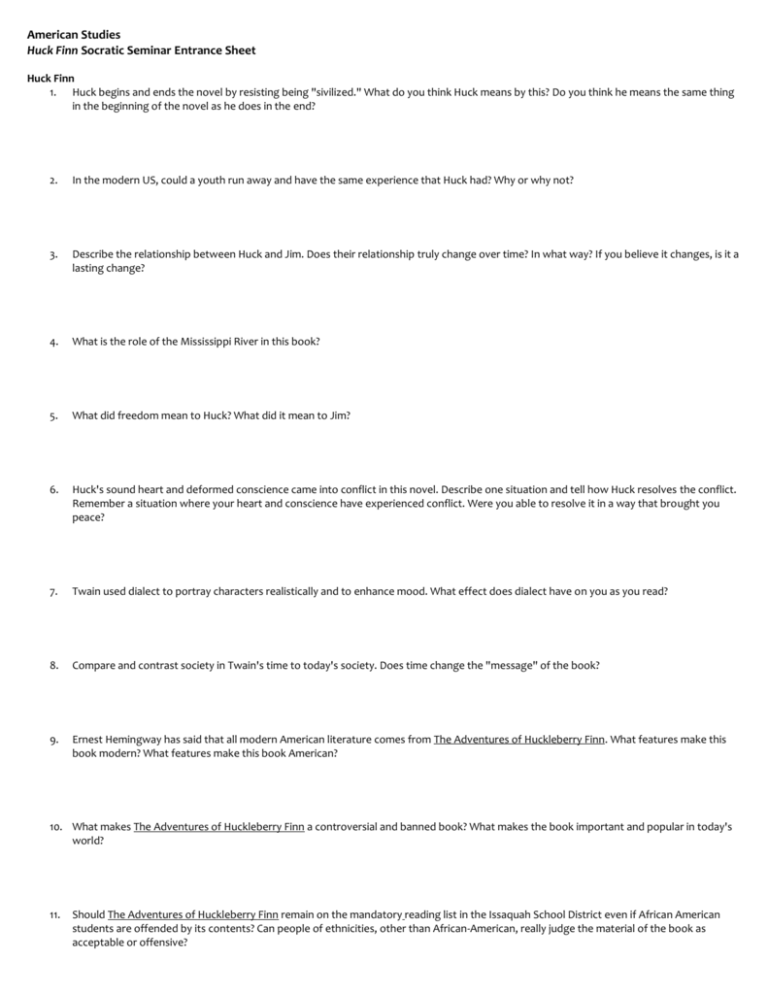
American Studies Huck Finn Socratic Seminar Entrance Sheet Huck Finn 1. Huck begins and ends the novel by resisting being "sivilized." What do you think Huck means by this? Do you think he means the same thing in the beginning of the novel as he does in the end? 2. In the modern US, could a youth run away and have the same experience that Huck had? Why or why not? 3. Describe the relationship between Huck and Jim. Does their relationship truly change over time? In what way? If you believe it changes, is it a lasting change? 4. What is the role of the Mississippi River in this book? 5. What did freedom mean to Huck? What did it mean to Jim? 6. Huck's sound heart and deformed conscience came into conflict in this novel. Describe one situation and tell how Huck resolves the conflict. Remember a situation where your heart and conscience have experienced conflict. Were you able to resolve it in a way that brought you peace? 7. Twain used dialect to portray characters realistically and to enhance mood. What effect does dialect have on you as you read? 8. Compare and contrast society in Twain's time to today's society. Does time change the "message" of the book? 9. Ernest Hemingway has said that all modern American literature comes from The Adventures of Huckleberry Finn. What features make this book modern? What features make this book American? 10. What makes The Adventures of Huckleberry Finn a controversial and banned book? What makes the book important and popular in today's world? 11. Should The Adventures of Huckleberry Finn remain on the mandatory reading list in the Issaquah School District even if African American students are offended by its contents? Can people of ethnicities, other than African-American, really judge the material of the book as acceptable or offensive? The Critics 12. Smiley states, "It is with the feud [Grangerfords & Shepherdsons] that the novel begins to fail" - agree or disagree and why? Prove it by the novel. 13. Smiley states, "As Leo Marx points out, and as most readers sense intuitively, once Tom reappears, '[m]ost of those traits which made [Huck] so appealing a hero now disappear...'" - agree or disagree and why? Prove it by the novel. 14. Smiley ascertains, "As with all bad endings, the problem really lies at the beginning, and at the beginning of The Adventures of Huckleberry Finn, neither Huck nor Twain takes Jim’s desire for freedom at all seriously, that is, they do not accord it the respect that a man’s passion deserves." - agree or disagree and why? Prove it by the novel. 15. Smiley states, "It is true that there could have been slave catchers in pursuit (though the novel ostensibly takes place in the 1840’s and the Fugitive Slave Act was not passed until 1850), but Twain’s moral failure, once Huck and Jim link up, is never even to account for their choice to go down the river rather than across it." - agree or disagree and why? Prove it by the novel. 16. Salwin exclaims that “[Huck Finn is] about nothing less than freedom and the quest for freedom” – other than freedom from being “sivilized” and slavery – what else is Twain saying the American public should be free from? Use the text from the novel. 17. Prove from the novel’s text: "’Huckleberry Finn knew, as did Mark Twain [Ellison wrote], that Jim was not only a slave but a human being [and] a symbol of humanity . . . and in freeing Jim, Huck makes a bid to free himself of the conventionalized evil taken for civilization by the town’" -- in other words, of the abomination of slavery itself” (Salwin). 18. Prove this is true of Twain, from the novel’s text, "’One of my theories is that the hearts of men are about alike, all over the world, whatever their skin-complexions may be’" (Salwin). 19. Prove from the novel’s text that Twain’s belief is "’nearly all black and brown skins are beautiful, but a beautiful white skin is rare’" (Salwin). 20. Prove from the novel’s text that Twain believes that "’there are many humorous things in the world; among them is the white man's notion that he is less savage than all the other savages’" (Salwin).

